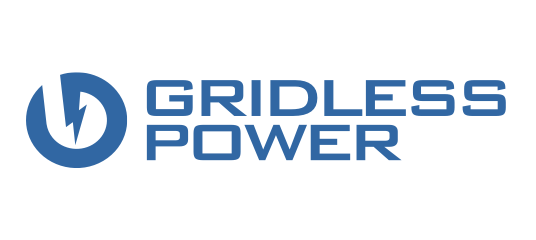Gridless Power hasn’t had to spend a lot of time looking for new customers. When organizations hear about their mobile battery technology, they usually come looking for them.
As the firm’s co-founder Patrick Murphy explains, the company was born out of a need to support expansion of the vineyard run by the family of his co-founder and friend since childhood, Jason Halpern. They needed energy for the irrigation system but realized it would be prohibitively expensive to get electricity out to the fields by relying on the town’s power grid.
Construction of a battery and a business plan to market it became Jason’s senior project while he was at the Wharton School of the University of Pennsylvania. With some insight from Patrick and their third friend and partner, Andrew Leonard, they developed a solar-powered battery that worked for the vineyard. The project also won an award from the Wharton School, as the best undergraduate business plan.
The award came with some grant money that the three partners used to refine their project. The battery they developed, based on concentrated photovoltaic technology, attracted interest from the New Jersey Department of Agriculture and the New Jersey Board of Public Utilities. The team received some additional grant money, but then they hit the first major roadblock in their careers as entrepreneurs.
Major solar panel companies had also made significant inroads with their technology. Over the course of about 18 months, the cost of solar power dropped from $5 a watt to $1.
Patrick and team had an effective prototype, but their product could no longer compete on a cost basis with other solar technologies.
One door shut, another opened
The experience didn’t lead to a dead-end. Instead, it revealed another door Patrick, Jason and Andrew could walk through.
“We discovered the really interesting work we’d done wasn’t simply the solar cells, but the development of the battery technology and various ways to deploy it,” says Patrick.
They had named their first company Power Flower Solar because their solar panel looked like a flower. When they decided to move beyond solar, they named their new company Gridless Power.
When they’d been working with the N.J. Department of Agriculture, the U.S. Department of Defense approached them and asked for help with bringing power to their Forward Operating Bases (FOBs) around the world. Both Power Flower Solar and Gridless Power did work for the U.S. Marine Corps, developing what Patrick proudly points out was a pioneering technology to deliver energy to the Marines’ FOBs.
The company’s fortunes were doing quite well, but then the entrepreneurs hit another roadblock. The U.S. Congress’s budget sequestration rules went into effect and spending for all items in the federal budget was reduced. The $3.3 million in funding the Gridless team had expected from the Department of Defense was cut.
Helping emergency responders
The team had batteries in their firm’s offices in southern New Jersey that they had thought would be deployed in Iraq and Afghanistan, and then Hurricane Sandy slammed the coastal areas of their home state.
The team made their batteries available to emergency responders. The police and fire teams who were called in to help residents deal with the aftermath of the hurricane were impressed with the technology and word spread.
“After Sandy, police and fire departments and cities across the Northeast decide to ramp-up their spending on technology to ensure that they’d be better prepared for the next disaster,” says Patrick. That led to the cities of Philadelphia and New York, as well as a number of other police and fire departments and emergency management agencies, becoming customers of Gridless Power.
Hurricane Sandy was not the only crisis when Gridless Power batteries supported the work of rescue missions. The firm’s technology was also used by rescuers after a major Amtrak derailment in Philadelphia.
The city’s experience with the batteries through that crisis led to a request for support during a visit from the Pope. As the Pope moved about the city, large security trailers moved with him. As Patrick says, representatives of the city told him, “We already use your batteries for our communications equipment, can you develop a battery-powered security camera for us that we can put on top of the trailers?”
The team did, and then local construction sites saw the technology. Construction sites are often the victims of theft, as people steal everything from copper wire to expensive equipment. The team developed a battery-powered security camera for the sites that had expressed interest, and now construction companies have become a whole new base of customers for the firm.
Guidance through the process
Emles Venture Partners was one of the early investors in Gridless Power. As Patrick explains, the firm’s partners – Gabriel Hammond and Emanuel (“Manny”) Zareh — provided not only financial support but also guidance through the entire fundraising process.
“When you’re running a firm, you get caught up in making sure the technology works, finding ways to grow the business and make it profitable, and handling the day-to-day operations,” says Patrick. “If you don’t have a full-time chief financial officer, knowing how the fundraising market works, and understanding the term sheets, valuations, and all the associated lingo, can be extremely difficult and time-consuming.”
He says, “It’s been great to be able to turn to Gabriel and Manny for advice on all that.” Patrick adds, “We’ve also relied on their expertise as we’ve shared our plans for growing the business.”
Manny has been equally impressed by Patrick and his team. He says, “Patrick is a great business operator, and he has successfully navigated Gridless through many peaks and troughs, and, most recently, through the pandemic.”
With each challenge, Manny notes, “Patrick has made Gridless a stronger company. I credit that to his resourcefulness, undergirded by a ‘roll-up-your-sleeve’ attitude from him, his partners, and their team, as they consider no task is too big or too small to tackle.”
Gridless now has several new products in the pipeline. Additional growth for the firm shouldn’t be much of a hurdle. All they apparently need to do is get their new products in the hands of a few customers. History suggests the rest will come knocking at their door.

Technology and connectivity are the lifeblood of the modern world. As people become more and more reliant on technology, reliable power becomes more critical. Gridless Power is needed whenever the grid isn’t available, whether there has been a disaster or technology is being deployed remotely. Gridless solves the most valuable off-grid power problems, both planned and un-planned.
Get in touch with Gridless Power
- Visit https://gridless.com/
- Email info@gridless.com
